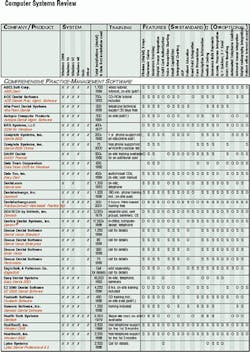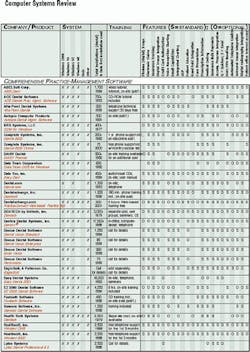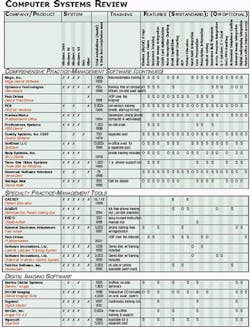2001 Computer systems review
by Paul Feuerstein, DMD
Since our last software survey, there have been many changes, both in the technology and corporate sectors. Approximately 16 practice management products, although still supported, are not being sold as new installations due to their acquisition by PracticeWorks Corp. Application Service Providers (ASPs) have appeared and disappeared. Companies also have introduced subscription via a monthly fee, as opposed to an outright purchase of software. Several companies have integrated their software with handheld devices, using either the Palm or Pocket PC interface. Electronic claims have the added option of sending digital radiographs and images using third-party software. Dentists can take advatage of these numerous advances.
Many offices have existing hardware and software, while some practitioners are setting up for the first time. The dilemma for many offices is that their old DOS systems work well; there is no incentive to upgrade or change. However, few word processors, spreadsheets, financial managers, or backup systems are readily available to add to these systems. The newer digital accessories — such as intraoral and digital cameras, digital radiographs, and the like — require more sophisticated hardware and software. Internet connections and electronic claims are also not feasible. Should an older hardware component break down, it is difficult if not impossible to find replacement parts. Offices still using these older systems must upgrade to the millennium standards.
We sent out questionnaires to practice-management and other software product companies in the marketplace and received responses from many of them. Company representatives were asked to choose from a specific list of features contained in each product. Many have unique features that will not show up in a simple chart such as the one shown here. What we hope to do is give a basic overview of the products and encourage you to contact as many compnaies as you can to get a good match for your own office needs.
Keep in mind that — although it appears that about a half-dozen products dominate the marketplace — there are several companies with fewer users that are quite satisfactory and have excellent support. These smaller companies can offer very personalized service. Some companies have a more local following; however, with Internet and remote access, any program can have global support. In addition, there are a few companies listed for dentists who are savvy enough to tweak a program to their own needs.
Most of the programs listed have basic features, such as appointment book, treatment planning, budget plans, recall management, insurance estimation (some integrate with a third-party database like Trojan), word processing (either internal or integrated with MS Word), and electronic claims.
Although these features exist, each system has a slightly different approach. It behooves the doctor and staff to see a demo of the procedures to see how they work in each individual office. Other things to consider that do not appear here are local personal vs. toll-free or online support.
One gray area is training. Most of the practice-management products list "training." Some offer in office or onsite training, while other companies offer training at their facilities. Still others were by "arrangement." With a few exceptions, most companies charge additional fees for training. User groups are available for many of the products, some of which occur at major dental meetings. Some offices might require additional time when adding new employees. These are all questions to ask individually and factors to consider in your purchase decisions.
We are often asked, "but which one is the best?" The answer is the one that the doctor and staff are most comfortable with. As you pore through our chart, realize that there are differences, some subtle and others dramatic, between the products. We encourage you to call, write, fax, use the Reader Service Card, check the Web sites, or email the companies for further information.
What is an ASP?An Application Service Provider is software and data that resides on the Internet. Your office connects via a modem — either high speed or even standard phone line (which would be slow) — and some workstations do not need sophisticated hardware. The company takes care of all updates and backups. It also can offer a service of sending out recall notices, statements, letters, etc., which frees up your staff for other tasks. It is interesting that in the 1970s the first computer systems worked just this way. A central computer called a Service Bureau had all of the information, which was called in nightly over an early version of modems. Some of you may remember DataMedic, the company that pioneered this. Questions have been raised about security, reliability of the connection, and confidentiality. All of these issues are being looked at by existing companies as well as the new ones on the horizon. Practice Connect by Dentalxchange, and Dental PackOnline, are two companies that offer ASPs, although others are in the works. Keep your eyes open for this interesting new twist on practice-management systems.

